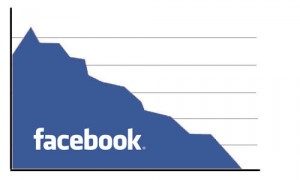In a highly controversial article, researchers at Princeton University recently predicted that Facebook would decline rapidly and lose all its customers within the next few years. Is Facebook really on the decline?
To answer this question, we have to first understand – is Facebook a disease? The researchers used what is known as an “SIR” model, which analyzes the typical trends of the spread of a disease. SIR models are used by organizations such as the NIH to understand how devastating an outbreak of a disease could be. (If you’re interested in learning more about this, the movie Contagion actually explains this rather well). SIR (which stands for Susceptible, Infected, and Recovered) models are computational models that can predict roughly how many people will become sick out of an entire population, based on how infectious the disease is and how long it takes people to recover. The Susceptible population (those who have not yet had the disease) comes in contact with the Infected population (those who currently have the disease) and contracts the disease at a certain rate, and the Infected population recovers or dies after a certain period of time. The authors compare the rise and fall of Facebook to that of MySpace.
So is Facebook a disease? Certainly if you were a parent of a child that recently signed up for Facebook, you might think so – hours of time spent staring at the computer with no energy for anything else, with no foreseeable end in sight (I know, I’ve been there). But, I would propose a different analytical approach instead.
A similar class of models could also be used to run this same analysis and might tell a completely different story. The Bass Diffusion Model, based on Everett Rogers’ work on innovation, is also a computational model in the same class as the SIR model, but is designed to understand the spread and use of a new product. The human population is divided into different categories based on their interest in trying new technologies. Innovators adopt the technology first – these are people who may be involved with the innovation in its early stages, then come people who really like to try new technologies (early adopters), next the early & late majority, and finally, the laggards (people who are very slow to adopt innovations). So what stage are we in? Just the other day, I spent a few hours with my dad explaining to him how to use Facebook to promote his music business. But he even had a Facebook account long before that. When I spoke to a colleague about setting up a Facebook group for business & career advice (a crowd that averages mid-late 30s – 50s) and expressed concern that people might not have Facebook accounts, she responded: “Doesn’t everyone have Facebook?” Given that almost half of the world’s population who have access to the internet according to this article have Facebook accounts, we’ve definitely passed the early adopters stage. However, there are still hundreds of thousands of potential adopters, which means Facebook’s user base may still continue to grow for years.
Now, there is another factor that also influences the rise/decline of things such as Facebook: critical mass. Critical mass occurs when a certain phenomenon (i.e. membership on Facebook) reaches a critical level of participation, and becomes a strong force to reckon with. This is especially true of technologies like Facebook that have a crucial social aspect. If all your friends are on Facebook, there is overwhelming pressure for you to be on Facebook as well. And with over 1.23 billion members, many of your friends are on Facebook.
The usefulness of Facebook should also not be overlooked. For advertisers and retail organizations, a Facebook presence is an extremely powerful tool to interact directly with customers and gauge attitudes towards the brand using Sentiment Analysis. Celebrities have also made good use of Facebook to keep up their image. George Takei, who is most famous for his role as Sulu on Star Trek Enterprise, is so good at spreading content on Facebook that he wrote a book about it.
So are people actually leaving Facebook? Some users are definitely more active than others. I can name several friends who have a Facebook but never use it. Do they use other things instead? Maybe, and maybe not. But usually, when a friend leaves Facebook or deactivates it, from my experience it’s only temporary, and has to do with things completely un-Facebook related. Unfortunately, many of the times it has to do with Facebook being an all too easy way to harass others and fuel gossip during an especially difficult situation. (Of course it wouldn’t be if nearly EVERYONE wasn’t on Facebook).
As someone who has had a Facebook account since September of 2005, I’ve definitely seen Facebook evolve and grow. Some changes I liked, some I didn’t (I postponed having to have a cover photo for as long as I could). But it’s hard to imagine life without Facebook. It’s so easy to reconnect with lost friends, and there isn’t another place that has so many of my friends in one place. Eventually, I’m sure the latest and greatest thing will come. Technologies don’t last forever. And Facebook is less popular with teenagers than things like Snapchat, as this article reports. But saying that Facebook will lose 80% of its users by 2017 is a bit drastic. After all, what is the cost of just having a Facebook account but not using it? Facebook is also not going to go down without a fight. If Facebook can figure out the innovations that are important to users, especially the younger demographic, it will still be a force to be reckoned with well past 2017.
Sophia Sullivan is a PhD candidate in Northwestern’s Industrial Engineering and Management Sciences Department. She can be reached at SophiaSullivan2014@u.northwestern.edu or http://www.linkedin.com/in/sophiadsullivan


